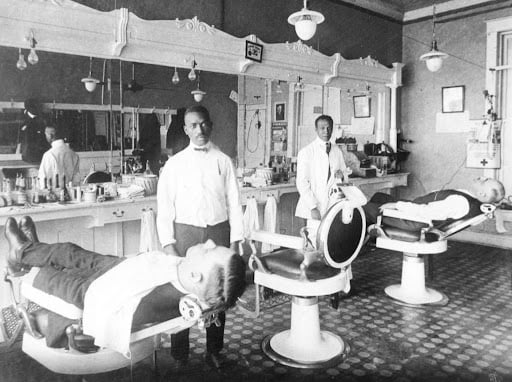To Whom It May Concern:
My barber recently opened his own business, moving on from the traditional Roosters Men’s Grooming Salon to the newer Salon Lofts, a European style shopping arcade of independent hairstylists. Commercial developer creates 20+ adjoining stalls in local strip mall, leases the space to stylists who wish to become private business owners, and collects the rent scot free of any liability for their customer service. A veritable flea market of cosmetology.
How and with whom they do business is now their call, each and all have a distinctive stall. Cougars surround the “Bend & Snap," while the “Wash & Set” has a wheelchair ramp. Even “Guns & Roses” offers whisky nips on a shelf with a jar marked “cash or tips.” It’s the American dream, or so it seems, except when we moralize with those we all fraternize.
After several appointments at my former salon, I followed my stylist when I learnt he'd moved on. He was pleasant, professional, always on time, so I clicked through his website and scheduled a time. The following day I received this reply:
Unfortunately, I am unable to take you on as a client. I do not think we are a good fit to work together. Thanks for thinking of me; I apologize for the inconvenience. Take care.
Should I sue, write a review, who should I talk to, what can I do? Do businesses in America have the right to refuse?
Signed,
Curl Up and Dye

Dear Curly,
In the United States, any business can refuse service to any person for any reason except race, color, religion, sex, and national origin. Here’s the backstory:
During Reconstruction, Congress passed the Civil Rights Act of 1875 which granted everyone in America access to public accommodations. However, the Supreme Court in 1883 canceled that when they ruled Congress did not have the power to prohibit discrimination in the private sector. Associate Justice Joseph P. Bradley opines for the majority in the Civil Rights Cases;
The Thirteenth Amendment merely abolished slavery. The Fourteenth Amendment does not give Congress the power to outlaw private acts of racial discrimination.
So after 187 years of segregation in housing, transportation, and public accommodations, U.S. President John F. Kennedy proffered a "Report to the American People on Civil Rights" on June 11, 1963. He sought legislation giving all Americans the right to be served in facilities which are open to the public including; hotels, restaurants, theaters, retail stores, and barbershops, too. He addressed the nation via radio from the Oval Office;
This nation was founded by men of many nations and backgrounds. It was founded on the principle that all men are created equal and that the rights of every man are diminished when the rights of one man are threatened.
The Civil Rights Act of 1964 — prohibiting private and public businesses from discrimination based on race, color, religion, sex, and national origin — soon followed, and remains the unchallenged gold standard of civil rights across the nation. To the extent it’s vague, California and New York tacked on discrimination based on sexual orientation and gender identity in their states, and Washington DC prohibits discrimination based on political affiliation in the nation’s capital.
Outside the net lies Masterpiece Bakery in Lakewood Colorado; who came under fire in 2012 for refusing to bake a wedding cake for a same-sex couple. Or President Donald Trump's Press Secretary, now Governor Sarah Huckabee Sanders, who was refused service by the Red Hen in 2018, a restaurant in Lexington Virginia, and escorted from the premises because of her political affiliation. Even Walgreens enables pharmacists to step away from filling prescriptions if the pharmacist has a “moral objection.”
When institutional racism embeds itself into the laws and regulations of a society, it manifests as discrimination in criminal justice, employment, housing, commerce, health care, education, public accommodations and politics.
New York City Mayor Ed Koch, who co-authored the Equality Act in 1974 while serving as a U.S. Representative in Congress said, "The time has come to rethink Plato's Ideal City, and certainly our own ideas about public accommodations in a modern republic."
The Equality Act would amend the Civil Rights Act of 1964 to prohibit discrimination on the basis of sex, sexual orientation and gender identity in employment, housing, education, federally funded programs, and public accommodations.
In the UK, The Equality Act consolidated a tranche of anti-discrimination laws in 2010 in England, Scotland, Wales and Northern Ireland. The Act reflects the EU Equal Treatment Directives that prohibit discrimination based on age, nationality, sex, citizenship, and sexual orientation.
But it was the Greek philosopher Aristotle who first opposed the notion of human equality. Moreover, he believed that women were incapable of authoritative decision making, and decreed manual laborers ineligible for education or citizenship in his opus, "Politics."
Enlightenment philosophers including Locke, Hume, Kant and Hegel all condoned institutional racism by advancing the idea that Black and Indigenous people the world over were savage, inferior and in need of correction by European enlightenment. They were the principle influencers of America’s founding fathers; who declared a nation rich with republican ideals in a salutary phrase that has yet to be fully written into federal law:
We hold these truths to be self-evident, that all men are created equal, that they are endowed by their Creator with certain unalienable rights, that among these are life, liberty, and the pursuit of happiness.
So of course you can sue, depending on what you can prove, or add to the milieu of Google reviews. However, you may wish to consider something entirely new. You're inalienable right of reply.
The “Right of Reply” is a legal term and opportunity to defend or correct a position in the same venue where it was first published. If and when written into the U.S. Constitution, the Equality Act will update the Civil Rights Act to effectively open the doors to each and all in the public square.
Archives










